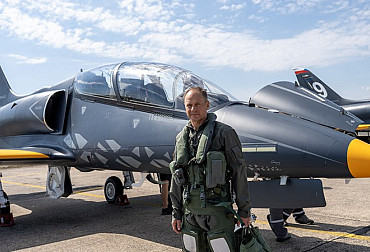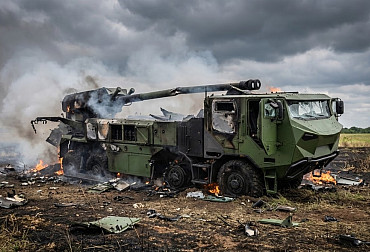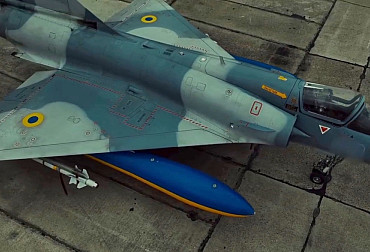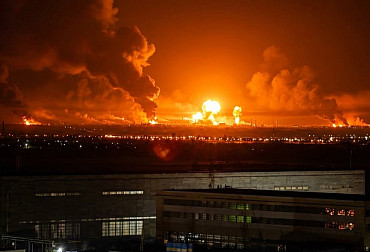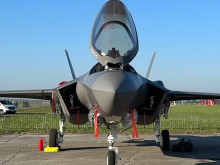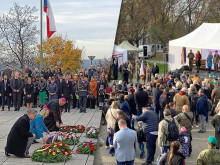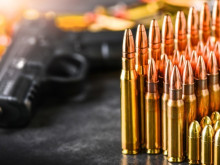Senators addressed weapons, the Concept of the Construction of the Army of the Czech Republic 2035 and defence industry issues
At its 20th session yesterday, the members of the Committee on Foreign Affairs, Defence and Security of the Senate of the Czech Republic held a meeting. This committee contains the agenda of the three parliamentary equivalents, namely the Defence Committee, the Security Committee and the Foreign Affairs Committee of the Chamber of Deputies. The committee considers bills already passed in the lower house in a similar way, i.e. it discusses the bills in committee and then passes them or returns them with amendments to the House for consideration. This procedure is currently being followed for the Ammunition Bill and the Arms and Ammunition Bill.
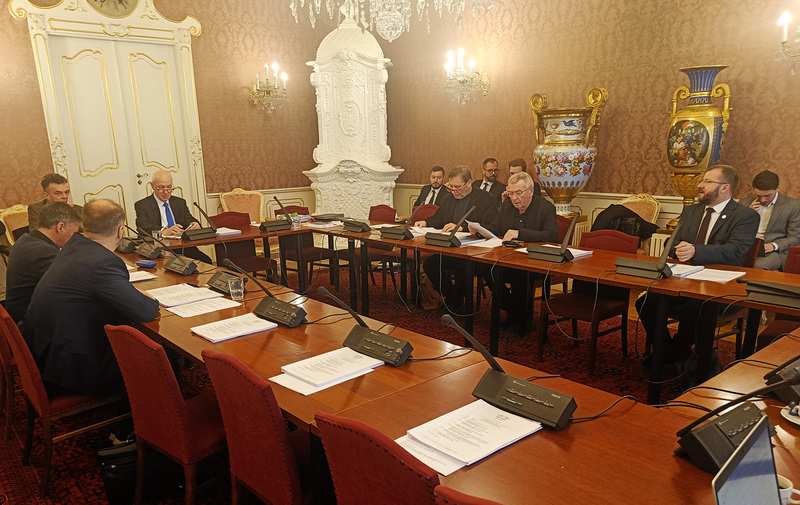
At the outset, it should be pointed out that the Senators postponed the final recommendatory vote until March 6, prior to the scheduled Senate meeting. Senator Václav Láska pointed out the possible contradiction of the law in his report, pointing to the possibility of easy availability of long guns for holders of firearms licences, which, according to him, unlike pistols or revolvers, are not used for defence. According to Senator Láska, this bill does not address the elimination of potential threats and, in addition, complicates the work of the Police of the Czech Republic. For example, in the case when police officers want to take away the holder's weapon due to his health condition or suspicious behaviour because he may be dangerous to his surroundings.
Deputy Interior Minister Radek Kaňa, on the other hand, presented the draft Weapons Act as significantly modernizing the existing weapons law, and in particular highlighted the consistent digitalization of the entire weapons agenda. According to him, the police have the possibility to immediately seize weapons from a person about whom there is information proving that the person poses a serious danger to internal order and security. It also introduces a reduction in the period for assessing the medical fitness of a holder of a firearms licence from ten to five years, an obligation for entrepreneurs to report suspicious transactions, an increase in police control activities, an expansion of the facts recorded in the Central Register of Weapons and an expansion of automatic updates and other functionalities. The proposal maintains the considerable stringency of the conditions under which a person can gain access to weapons, but removes excessive bureaucracy and reduces the administrative burden on both gun owners and state authorities. The law significantly strengthens elements of eGovernment. Paper documents are abolished. The vast majority of actions and submissions will be possible to be made electronically, through the Central Register of Weapons application or through the public administration portal. The proposal defines weapons more precisely and divides them into six categories. Access to them will be graded according to their potential danger. Instead of five categories of firearms licences for natural persons, the Weapons Act introduces only two types of firearms licences. Weapon licences will be issued for an indefinite period of time, with the Police of the Czech Republic regularly checking at least once every five years whether the person continues to meet the statutory requirements for holding a weapon licence, such as full legal capacity, integrity, reliability and medical fitness. Instead of ten groups of firearms licences for legal entities or natural persons engaged in business, the Weapons Act introduces only three groups of firearms licences.
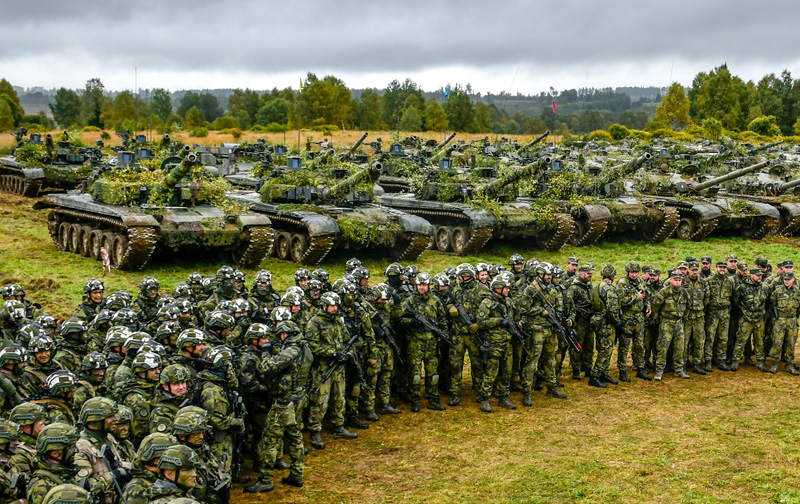
During the meeting, the senators also dealt with the material discussed earlier in the Defence Committee, namely the Concept of the Construction of the Army of the Czech Republic 2035. This concept was discussed in the lower chamber after an extensive and emotional debate, so-called without an opinion. Also on the floor of the Senate, First Deputy Defence Minister František Šulc reiterated this time that the submitted material marks a return to systematic work on the modernisation of the army, which is made possible in particular by the enactment of defence spending of 2% of GDP. "In doing so, it rationally and sensibly balances the need to prepare for a high-intensity conflict," Deputy Minister Šulc presented the concept, adding that the deficit of the past, which was primarily financial, was reflected in the low stock levels and in the modernisation of the army, which he said was overdue. He also recalled the problematic fulfilment of the commitment to the North Atlantic Treaty Organisation, which is paying for these long-term shortcomings.
The basic parameters of this key document were presented to the senators by the 1st Deputy Chief of the General Staff of the Czech Armed Forces, Lieutenant General Miroslav Hlaváč. He pointed out the need for drastic solutions in the personnel area, as well as in the development and maintenance of the army's capabilities. "The vision and concept emphasises that the army will be able to synergise all parts of the army, which means ground forces, air forces, cyber forces and territorial forces. The Alliance defines five domain spaces for conducting combat operations, which are space, sea, air, land communications, land domain and cyberspace," General Hlaváč said.
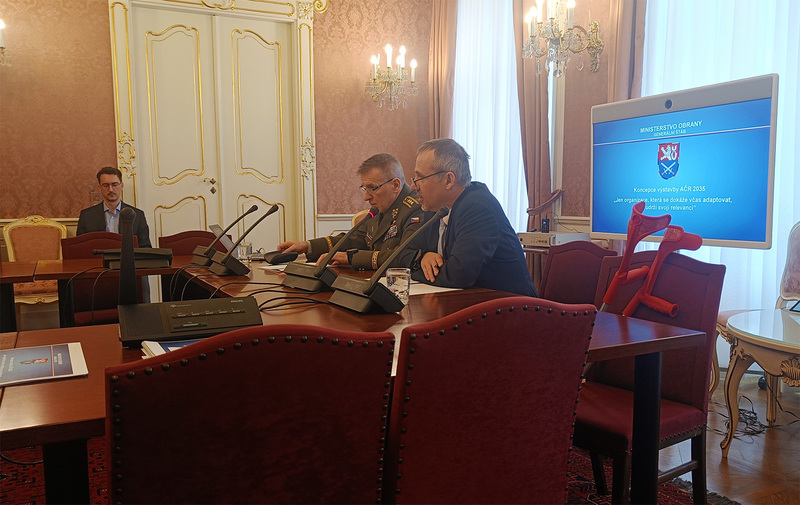
At the same time, he informed the senators about the plan to build a technological battalion as an experimental unit. "Around 2030, we want to start building it, where we basically want to test mainly robotic machines and means that would allow us to develop further into the 21st century, It will be a kind of test unit, where we want to use especially young officers and soldiers in this and, of course, develop other capabilities of the army in the future," said 1. The senators then pointed out in the debate that the issues of building defence and army construction should not be influenced by political struggle and should be non-partisan at all times and took note of the Concept of the Construction of the Army of the Czech Republic 2035.
The senators also returned to another topical issue that is troubling the defence industry for a change, namely the conditions of financing of Czech defence industry projects in the Czech Republic and the EU. Similarly to what Defence Minister Jana Černochová said after the meeting with representatives of defence industry companies on Monday, 1st Deputy Minister František Šulc also reminded in this context that the importance of the defence industry has been coming to the fore since the Russian aggression in Ukraine. Unfortunately, however, he is faced with the attitude of the banking sector, where European regulations are making life difficult for our defence industry, but also for industries across Europe. As a result, companies are unable to obtain money from the banks to finance contracts and have to find resources elsewhere. The director of the Agency for Intergovernmental Defence Cooperation, Ales Vytečka, reminded that between 2022 and 2023, the export of military equipment has increased extremely to the level of CZK 30 billion. "About 70% of export licenses in the Czech Republic were granted to Ukraine. This means that we are absolutely dominantly focused - both the state and companies - on helping Ukraine," Vytečka said. However, this increase in production, which in some cases is more than tenfold, needs to be financed in some way. After a detailed discussion, the senators stated that they would be actively involved in supporting the Czech defence industry and approved the following resolution:
On the conditions of financing projects of the Czech defence industry in the Czech Republic and the EU Committee:
1. recalls that Russia's illegal, unjustified and unprovoked aggression against Ukraine has been going on for more than two years and is still continuing. And we recall that, in the context of the fundamental deterioration of the security situation as a result of Russia's military aggression, it is essential to strengthen the national security and defence capacity of the state.
2. We recall, as a Committee, our resolution number 149, adopted at its twenty-fourth session on 15 March 2022, in which the Committee stated that our security is also being decided in Ukraine and that it is therefore in the interest of the Czech Republic to support Ukraine to the maximum extent possible in its efforts to defend its sovereignty and territorial integrity, and on this occasion the Committee expressed its support for the Government of the Czech Republic in providing assistance to Ukraine with a view to strengthening its effective defence against military aggression, including the supply of military equipment.
3. We appreciate that the Government of the Czech Republic has been able to provide significant support to Ukraine.
4. We note that the Government of the Czech Republic is responsible for the defence of the State. Here, we are only quoting the Constitution of the Czech Republic: it is responsible for the economic strategy of the state and, therefore, for creating the conditions for doing business or for awarding public contracts in these extraordinary times.
5. We express our conviction that a strong domestic defence industry is the basis of national security, while allowing us to support our EU and NATO partners or countries threatened by aggression that have requested assistance in accordance with the UN Charter.
6. We consider it essential that the Government of the Czech Republic, firstly, continues to intensively support the domestic defence industry, and secondly, systematically creates favourable conditions for financing the defence industry in the Czech Republic, including by using EU and NATO instruments and resources.
Instructs its chairman to inform the President of the Senate, the Prime Minister, the Minister for Defence, the Minister for Industry and Trade and the Minister for Foreign Affairs of this resolution.
In connection with the above, we asked the Chairman of the Committee on Foreign Affairs, Defence and Security of the Senate of the Czech Republic, Pavel Fischer, additional questions:
1. How do you perceive the discussion in the Foreign Affairs, Defence and Security Committee on the draft Law on Arms and Ammunition. Is there anything you think needs to be added to the legislation?
The discussion at the Committee was fruitful. As a result of the discussion, the question arises as to whether it is enough to have the same rules as the EU, or whether we should tighten them up, for example, for the possession of long guns. In my opinion, it is also quite appropriate to talk about the use of silencers for short guns, which today are unrestricted. There are more questions, and I wonder, among other things, when the Government will prepare the next amendment to the existing laws.
2. Unlike the House Committee on Defence, the Committee expressed unanimous support for the Concept of the Construction of the Army of the Czech Republic 2035. How can senators help depoliticize the debate over the level of national defense spending and Army modernization projects?
Our country does not have two armies - one of Jana Černochová and the other of Andrej Babiš. We have one Army of the Czech Republic and the government and the opposition must behave accordingly. In this sense, we in the Senate strive not to deal with political parties, but to keep in mind the defence of the Republic as a priority.
3. As after Monday's meeting at the Czech Ministry of Defence, your support was voiced today for the domestic defence industry, which is facing significant complications caused by EU regulations and banks' attitudes towards financing arms programmes. How can Senators, or the Czech Parliament as a whole, help companies operating in the defence industry?
In this sense, the Senate is no substitute for the banks or the government we are charged with policing. But we do have the ability to take issues to the EU level, for example when the Senate is debating the mandate for the European Council. In addition, we can help the government build political coalitions with EU and NATO countries with which we see potential for cooperation. Personally, I have long been working on various security issues with colleagues from partner committees abroad to prepare the ground for important decisions in our home parliaments. Examples include arms and financial support for Ukraine, defence against non-democratic actors, and now the urgent need to help the defence industry.











